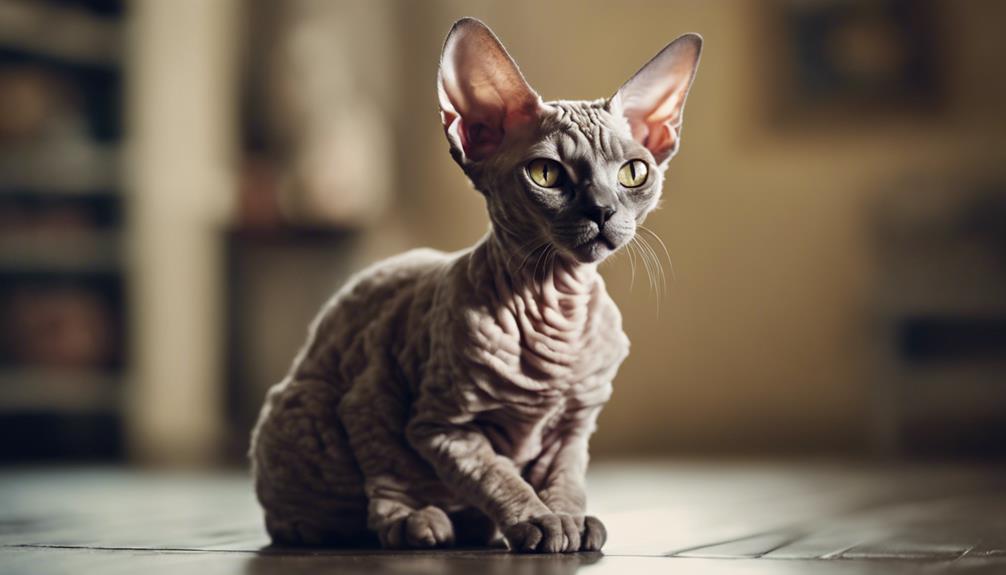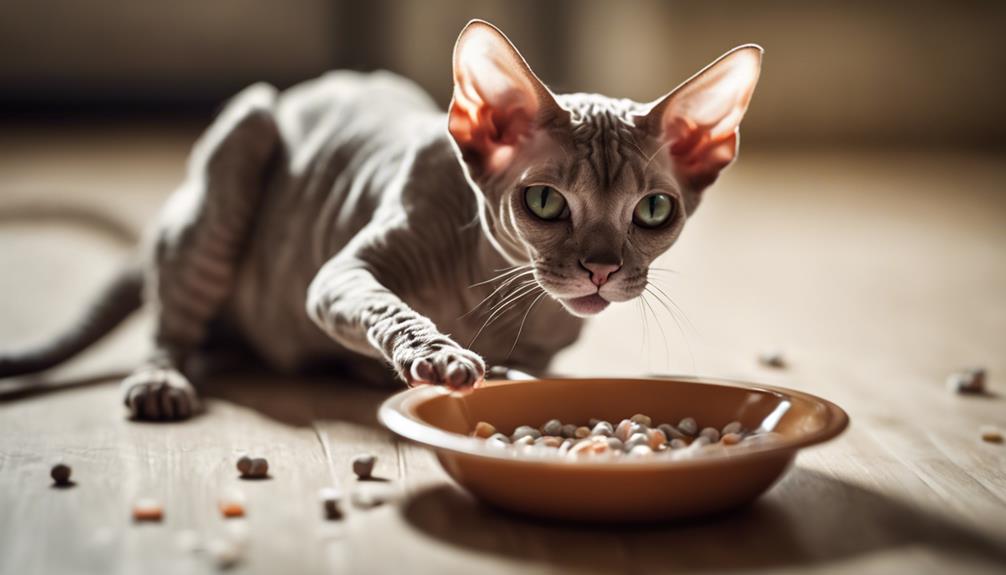As a cat lover who has experienced the joys and challenges of living with feline companions, the concept of a hypoallergenic cat breed may seem like a myth.
However, the Devon Rex cat defies conventional wisdom with its unique coat that sets it apart from other feline friends.
The secret behind the Devon Rex’s hypoallergenic fur lies in its genetic makeup, but there’s more to uncover about how this breed’s coat can potentially make life easier for allergy sufferers.
Key Takeaways
- Devon Rex cats produce lower levels of Fel d 1 protein, reducing allergic reactions.
- Their minimal shedding and unique coat structure minimize allergen spread.
- Proper grooming techniques help trap loose fur and dander, decreasing allergens.
- Balanced nutrition supports skin health and reduces allergen production.
Understanding the Fel D 1 Protein

Why is the Fel d 1 protein a key factor in understanding cat allergies and the hypoallergenic qualities of the Devon Rex breed?
The Fel d 1 protein, commonly found in cat saliva, skin, and dander, triggers allergic reactions in sensitive individuals. However, Devon Rex cats produce lower levels of Fel d 1 compared to other breeds, contributing to their hypoallergenic qualities.
By having reduced Fel d 1 production, Devon Rex cats can help minimize allergic reactions in allergic people. This reduced allergen load makes them a more suitable option for individuals prone to cat allergies.
Understanding the role of Fel d 1 protein levels is crucial in explaining why Devon Rex cat fur is considered hypoallergenic.
Minimal Shedding Characteristics of Devon Rex
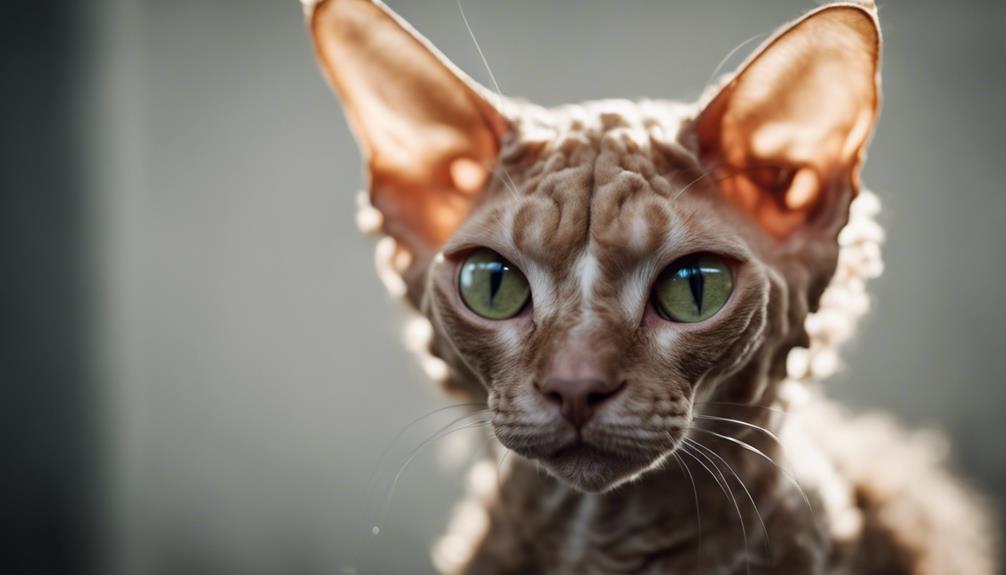
The minimal shedding characteristics of the Devon Rex cat breed are a result of its unique coat texture and structure, which effectively trap and contain loose fur, contributing to their hypoallergenic qualities.
- The wavy coat texture of Devon Rex cats helps reduce allergen spread by holding onto loose fur.
- Devon Rex cats are often nicknamed ‘Poodle cats’ due to their low-shedding nature similar to Poodles.
- Their unique coat structure minimizes shedding, making them suitable for individuals with allergies.
- This low-shedding trait means Devon Rex cats require less grooming compared to other breeds with higher shedding rates.
These features make the Devon Rex an ideal choice for those seeking a cat with minimal shedding and reduced allergen exposure.
Grooming Tips for Hypoallergenic Fur
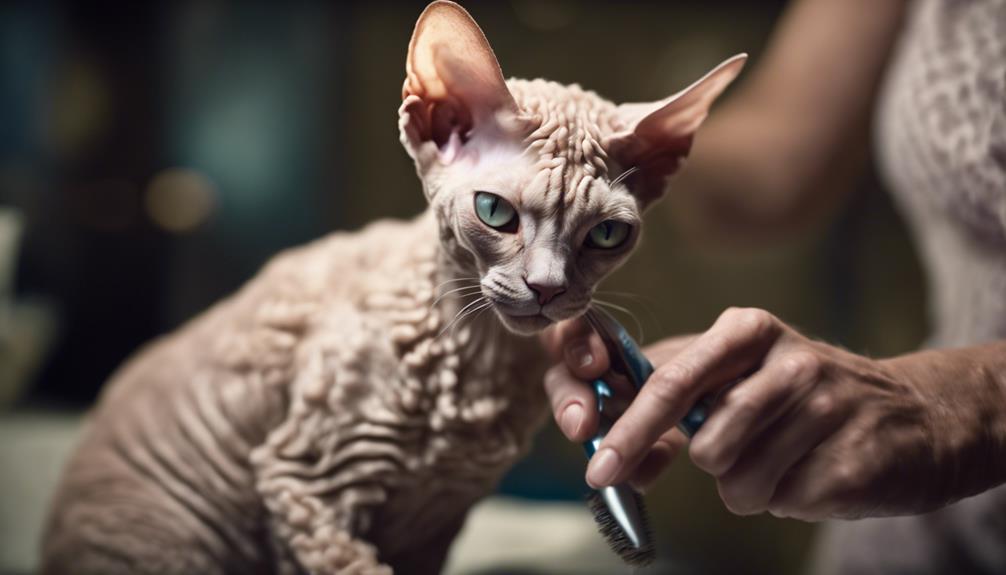
To maintain the hypoallergenic fur of Devon Rex cats, utilizing gentle grooming techniques is essential for effectively managing shedding and allergen exposure. Due to their unique coat texture, regular grooming practices play a crucial role in minimizing shedding and preventing the distribution of allergens in the environment. Devon Rex cats’ wavy, short to medium length coat helps trap loose fur and dander, reducing the presence of allergens.
While these cats are known for minimal shedding, it’s important to note that they can still produce allergens from dander and saliva, necessitating consistent grooming. Opting for gentle grooming techniques such as using hands or feline wipes instead of brushes can help maintain the hypoallergenic qualities of Devon Rex cat fur.
Nutritional Considerations for Allergen Reduction

Nutritional choices significantly impact the reduction of allergens for Devon Rex cats, influencing their skin health and shedding levels.
- A balanced diet supports skin health, potentially reducing allergen levels.
- Proper nutrition helps maintain the coat’s condition, minimizing the spread of allergenic proteins.
- Omega-3 fatty acids in high-quality food may contribute to a healthier coat, potentially lowering allergen production.
- Essential nutrients in the diet can strengthen the skin barrier, decreasing allergen exposure.
Training for Allergy-Friendly Cat Behavior
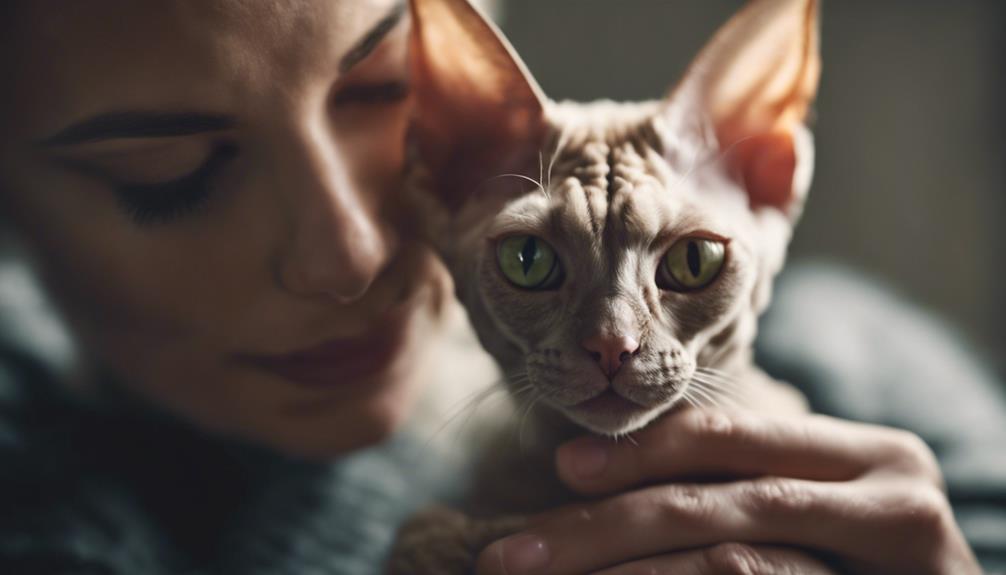
Considering the impact of behavior on allergen exposure, training plays a crucial role in fostering allergy-friendly habits in Devon Rex cats. Training your Devon Rex to avoid allergen-triggering behaviors, such as excessive licking or scratching, can help minimize allergic reactions. Teaching them to use designated areas for grooming and playing reduces the spread of allergens. Positive reinforcement techniques like treats and praise encourage desirable, hypoallergenic behaviors. Consistent training to discourage allergen-spreading habits like jumping on furniture or sleeping in your bed maintains a hypoallergenic environment. Engaging in interactive play and mental stimulation activities redirects their energy away from exacerbating allergies.
| Training Tips for Allergy-Friendly Behavior | Benefits |
|---|---|
| Avoid allergen-triggering behaviors | Minimize allergic reactions |
| Use designated areas for grooming and play | Reduce allergen spread |
| Positive reinforcement for hypoallergenic behavior | Encourage desirable habits |

